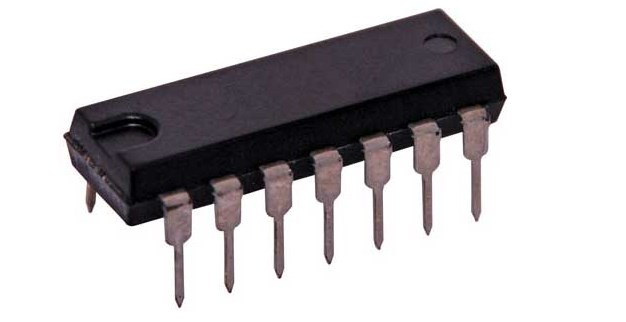Inverter integrated circuit is a common object applied in electronic equipment. The main function of it is to convert direct current (DC) to alternating current (AC). Its main application areas include power electronics, communications, computers, automotive electronics, etc. So now let us have a look about it!
What Is Inverter Integrated Circuit

In the context of electrical engineering and power electronics, an inverter integrated circuit (IC) is a semiconductor device that is designed to perform the function of an inverter in a compact and efficient manner. An inverter is a circuit that converts direct current (DC) into alternating current (AC).
Inverter ICs typically include all the necessary components for converting DC power to AC power in a single integrated package. These components can include power transistors, driver circuitry, control logic, protection circuits, and other necessary features to efficiently and reliably convert power.
Some common features and characteristics of inverter integrated circuits include:
-
High Efficiency: Inverter ICs are designed for high efficiency power conversion, minimizing losses during the DC to AC conversion process.
-
Compact Design: Integrated circuits are able to incorporate multiple components and functions into a single package, making them space-efficient and easy to integrate into various systems.
-
Protection Circuitry: Many inverter ICs include built-in protection features such as over-current protection, over-voltage protection, and thermal shutdown to safeguard the system and the IC itself.
-
High Frequency Operation: Some inverter ICs are designed to operate at high frequencies to reduce the size of the magnetics (such as transformers and inductors) required in the system.
-
PWM Control: Pulse Width Modulation (PWM) control is commonly used in inverter ICs to regulate the output voltage and frequency, providing a smooth and stable power output.
-
Integration with Control Circuits: Inverter ICs often include control logic and circuitry for managing the inverter operation, such as frequency control, voltage regulation, and start-up sequences.
-
Voltage Levels: Inverter ICs support a range of voltage levels, enabling them to be used in various applications, from low-power to high-power systems.
Overall, inverter integrated circuits play a crucial role in various applications where DC-to-AC power conversion is required, such as in solar inverters, motor drives, uninterruptible power supplies (UPS), and other power electronic systems. They offer a convenient and efficient solution for converting power while incorporating protection and control features in a single compact package.

Product Characteristics of Inverter Integrated Circuit
nverter integrated circuits (ICs) have several key product characteristics that make them essential components in various power electronics applications. Here are some of the important product characteristics of inverter integrated circuits:
-
Efficiency: Inverter ICs are designed for high efficiency power conversion to minimize energy losses during the DC to AC conversion process. High efficiency helps reduce power consumption and heat generation.
-
Output Power Rating: Inverter ICs are available in various power ratings to suit different application requirements, ranging from low-power applications like consumer electronics to high-power applications like industrial motor drives.
-
Input Voltage Range: Inverter ICs support a range of input voltages, making them versatile for use in different systems that may have varying input voltage requirements.
-
Output Voltage and Frequency Control: Many inverter ICs offer adjustable output voltage and frequency control features, allowing users to customize the output as needed for specific applications.
-
Protection Features: Inverter ICs often include built-in protection features such as over-current protection, over-voltage protection, thermal shutdown, and short-circuit protection to safeguard the IC and the connected components from damage.
-
PWM Control: Pulse Width Modulation (PWM) control is commonly used in inverter ICs to regulate the output voltage and frequency, providing precise control over the output waveform.
-
Integrated Circuitry: Inverter ICs incorporate various components and functions into a single integrated package, including power transistors, driver circuits, control logic, and protection circuitry, which helps reduce the overall system complexity.
-
Compact Design: The integration of multiple functions into a single package results in a compact design, saving space and making it suitable for applications where size constraints are essential.
-
Reliability: Inverter ICs are designed for high reliability and long-term operation in demanding environments. They undergo rigorous testing and have features to ensure operation under a wide range of conditions.
-
Application Specific Features: Some inverter ICs are tailored for specific applications, such as solar inverters, motor drives, uninterruptible power supplies (UPS), and other power electronics systems, with features optimized for these particular use cases.
These product characteristics make inverter integrated circuits versatile and essential components in modern power electronics systems, offering efficiency, flexibility, protection, and reliability in a compact design.

Usage And Application Of Inverter Integrated Circuit
Inverter integrated circuits (ICs) find applications in a wide range of power electronic systems where efficient DC to AC power conversion is required. These ICs play a crucial role in various applications across industries, some of which include:
-
Uninterruptible Power Supplies (UPS): Inverter ICs are used in UPS systems to convert DC power from batteries or other sources into AC power to provide backup power during outages or fluctuations in the mains power supply.
-
Solar Power Systems: Inverter ICs are fundamental components in solar inverters, which convert the DC power generated by solar panels into AC power that can be used to power homes, businesses, and the grid.
-
Motor Drives: Inverter ICs are employed in motor drive systems to control the speed and torque of electric motors by converting DC power to variable-frequency AC power.
-
HVAC Systems: Heating, Ventilation, and Air Conditioning (HVAC) systems use inverter ICs to control the speed of the compressor motor to achieve energy-efficient operation and precise temperature control.
-
Industrial Equipment: Inverters are utilized in various industrial equipment such as pumps, compressors, fans, and others to regulate motor speed and improve energy efficiency.
-
Consumer Electronics: Inverter ICs are found in consumer electronics like air conditioners, refrigerators, washing machines, and televisions to control the operation of motors and compressors efficiently.
-
Renewable Energy Systems: Inverter ICs are used in wind energy systems, hydroelectric power systems, and other renewable energy applications to convert the generated DC power into usable AC power for distribution.
-
Grid-Tied Systems: Inverter ICs are crucial in grid-tied systems where excess power generated from renewable sources can be fed back into the grid, ensuring efficient power conversion and grid compatibility.
-
Electric Vehicles (EVs): Inverter ICs are integral components in electric vehicle powertrains, converting DC power from the batteries into AC power to drive the electric motors that propel the vehicle.
-
Telecommunications: Inverter ICs are utilized in backup power systems for telecommunication equipment to ensure reliable operation during power failures, providing seamless power conversion.
In summary, inverter integrated circuits are versatile components used in various power electronics applications to efficiently convert DC power to AC power. Their usage spans across industries, contributing to energy efficiency, reliability, and functionality in a wide range of systems from consumer electronics to industrial applications and renewable energy systems.
Best 3 Suppliers of Inverter Integrated Circuit
As of my last knowledge update in September 2021, I can provide you with some well-known suppliers of inverter integrated circuits (ICs) that are recognized for their quality products and reliable services. However, please note that the status of suppliers can change over time, so I recommend verifying the current status and reputation of these suppliers:
-
Texas Instruments (TI): Texas Instruments is a reputable semiconductor company known for its wide range of integrated circuits, including inverter ICs. TI offers a variety of power management ICs, motor drivers, and other components suitable for inverter applications. TI is recognized for its high-quality products and comprehensive technical support.
-
STMicroelectronics: STMicroelectronics is a global semiconductor manufacturer that offers a broad portfolio of power management ICs, including inverter ICs for various applications such as motor drives, solar inverters, and industrial equipment. STMicroelectronics is known for its innovative solutions and reliability in the semiconductor industry.
-
Infineon Technologies: Infineon Technologies is a leading semiconductor manufacturer that provides a range of power electronics solutions, including inverter ICs for motor drives, renewable energy systems, and automotive applications. Infineon is well-regarded for its high-performance power semiconductors and integrated circuit solutions.
These suppliers are recognized for their expertise in power electronics and are trusted by many industries for their high-quality inverter integrated circuits and related components. It is recommended to visit their official websites or contact their local distributors for the most up-to-date information on product availability and specifications.
The Methods to Choose The Best Inverter Integrated Circuit
Selecting the best inverter integrated circuit (IC) for your project or application is crucial to ensure optimal performance, efficiency, and reliability. Here are some key methods and factors to consider when choosing the best inverter IC:
-
Define Requirements: Clearly define your project requirements, such as input voltage range, output power rating, efficiency targets, size constraints, and any specific features or functions needed for your application.
-
Application Compatibility: Ensure that the inverter IC you choose is compatible with the specific requirements of your application, whether it's for solar inverters, motor drives, UPS systems, consumer electronics, or other applications.
-
Technical Specifications: Consider important technical factors such as input voltage range, output power rating, output voltage and frequency control, efficiency, protection features, and integration capabilities.
-
Reliability and Quality: Choose inverter ICs from reputable suppliers known for producing high-quality and reliable semiconductor products. Look for suppliers with a track record of delivering dependable components.
-
Application Support: Check if the supplier offers technical support, application notes, reference designs, and other resources to assist you in implementing the inverter IC effectively in your design.
-
Development Tools: Evaluate the availability of evaluation kits, development boards, software tools, and simulation models provided by the supplier to aid in the design, testing, and optimization of the inverter circuit.
-
Cost Consideration: Balance performance requirements with cost constraints. Compare the pricing of different inverter IC options while considering the overall value, quality, and features offered by each manufacturer.
-
Efficiency and Power Handling: Select an inverter IC that offers high efficiency and can handle the power requirements of your application without compromising performance.
-
Future Scalability: Consider the scalability and flexibility of the chosen inverter IC for potential future upgrades or modifications to your system.
-
Reviews and Recommendations: Look for reviews, testimonials, and recommendations from other engineers or users who have experience with the specific inverter ICs you are considering. This can provide valuable insights into the performance and reliability of the components.
By carefully evaluating these factors and methods, you can choose the best inverter integrated circuit for your specific application, ensuring that your power electronics system operates efficiently, reliably, and effectively.



